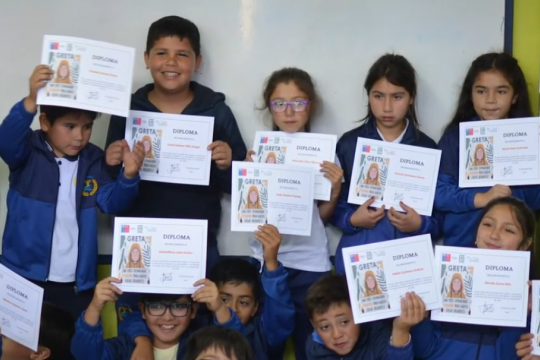Chile EfD researchers Marcela Jaime and César Salazar in cooperation with the Chilean Ministry of Environment designed and implemented an environmental education program on marine plastic pollution with value-laded content, targeting 1,058 fourth grade students from the public, subsidized, and private schools. The aim of the project was to evaluate the direct and indirect effects of the program on students' and parents’ knowledge, attitudes, and practices (KAP) regarding the consumption and disposal of plastics.
The intervention considered a random selection of 30 schools, being 15 schools assigned to the treatment group, and 15 schools assigned to the control group. Although participating schools take part in the Sustainable School Program in the Bio-Bio Region, students in the treated schools received special training on the marine plastic pollution problem and the extent to which we could contribute with its solution in our daily life. The program consisted of an adaptation and implementation of the contents embedded in the educators’ guide to marine debris [NOAA, 2015]. It includes 3 modules (2 lessons per module, and 2 pedagogical hours per lesson), which were accompanied by an opening and closing lecture, with a total duration of 18 pedagogic hours (45 minutes each). These contents were administered as part of their subjects and were reinforced with messages, activities, and homework appealing to personal norms, being the latter designed to invoke parent’s attention indirectly.
The experience of the project was recorded in a video in which EfD researchers explain the design, implementation, and results from this intervention as well as policy interactions derived from this experience.
According to Marcela Jaime “designing and implementing this intervention was a meaningful experience. It allows us to understand the profound inequality existing in the Chilean school system, and the lack of opportunities children under more disadvantageous conditions have in terms of the promotion of environmental values. We believe this intervention will help to reduce this gap, and this experience will have a positive impact on their lives in many aspects. We really hope this initiative can be promoted further, targeting even more children along with the country”.
César Salazar indicated that “the experience of participating in this program was quite enriching. Doing something with policy impact on children is a tremendous challenge but also a great responsibility. I believe the program was able to engage the whole educational community of participating schools, from principals to parents. Children enjoyed lectures and activities and told our teacher and monitors that they really tried to transmit what learned to their parents at home. The program was able to engage policymakers with who we are working on disseminating results and elaborating an educational manual that will allow for replications in other schools and regions.”
The environmental educational project is part of The Sustainable Management of Coastal Marine Resources (CMaR) Program. The CMaR program focuses on the interface between land and ocean and how ecological and social aspects influence vulnerable (women, youth) populations' welfare. Besides, the program aims to provide useful policy advice by having a good understanding of the institutions supporting coastal socio-ecological systems. If you want to know more about the CMaR Program, please click here.
